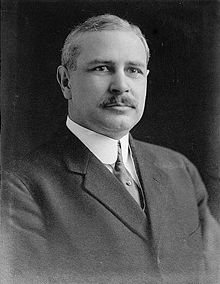James Fairman Fielder
James Fairman Fielder | |
|---|---|
 | |
| Acting Governor of New Jersey | |
| In office March 1, 1913 – October 28, 1913 | |
| Preceded by | Woodrow Wilson as Governor |
| Succeeded by | Leon R. Taylor as Acting Governor |
| 35th Governor of New Jersey | |
| In office January 20, 1914 – January 15, 1917 | |
| Preceded by | Leon R. Taylor as Acting Governor |
| Succeeded by | Walter Evans Edge |
| Member of the New Jersey Senate | |
| In office 1908–1913 | |
| Member of the New Jersey General Assembly | |
| In office 1903–1904 | |
| Personal details | |
| Born | February 26, 1867 Jersey City, New Jersey[1] |
| Died | December 2, 1954 (aged 87) Newark, New Jersey |
| Political party | Democratic |
| Spouse | Mabel Crowell Miller (1874-1953) |
James Fairman Fielder (February 26, 1867 – December 2, 1954) was an American politician of the Democratic party, who served as the 35th Governor of New Jersey, from 1913 to 1917, with a break of several months when he stepped down from office to avoid constitutional limits on serving successive terms.
Biography
He was born in Jersey City, New Jersey on February 26, 1867 to United States Congressman George Bragg Fielder.
After law school, he became a member of the New Jersey General Assembly representing Hudson County, New Jersey from 1903 to 1904. He was then a member of the New Jersey Senate from Hudson County from 1908 to 1913.
The New Jersey Senate convened in January 1913 after Woodrow Wilson had won the 1912 Presidential Election and Fielder was selected to serve as President of the New Jersey Senate. This set him up to become acting Governor of New Jersey starting on March 1, 1913.
Fielder resigned from his Senate office on October 28, 1913, so as to "create a vacancy in the governorship and avoid constitutional limits on succeeding himself". After winning "re-election," he took office on January 20, 1914, and served a full term in office, from January 20, 1914 to January 15, 1917.
Fiedler died on December 2, 1954 of a heart attack at Mountainside Hospital.[2] He was buried in the mausoleum in Fairmount Cemetery, Newark.
See also
References
- ^ "New Jersey Governor James Fairman Fielder". National Governors Association. Retrieved August 27, 2013.
- ^ "Ex-gov, J. Fielder Of Jersey Is Dead. Successor to Wilson Served Until 1917. Was Court Vice Chancellor for 40 Years". New York Times. December 3, 1954. Retrieved March 27, 2010.
James Fairman Fielder, Governor of New Jersey, died to-day at the Mountainside Hospital. His age was 87. ...
External links
- 1867 births
- 1954 deaths
- American Episcopalians
- Burials at Fairmount Cemetery (Newark, New Jersey)
- Governors of New Jersey
- Members of the New Jersey General Assembly
- New Jersey Democrats
- New Jersey State Senators
- Politicians from Jersey City, New Jersey
- Presidents of the New Jersey Senate
- Democratic Party state governors of the United States

